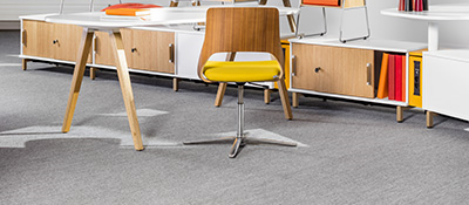October 2, 2016
Apple HQ + Limits of workplace design + Workplace effectiveness 0
 In this week’s Newsletter; Tim Oldman argues that businesses are failing to understand the basis of workplace effectiveness; Mark Eltringham looks at ways of using workplace design to influence the feelings and behaviour of others; and takes part in a podcast with Hari Kalymnios, author, trainer and Leadership Speaker at The Thought Gym. HSBC moves 300 staff into a coworking space in Hong Kong; Apple reveals it is to occupy the redeveloped Battersea Power Station and post-Brexit employment levels maintained by the growing gig economy. The global introduction of sustainable building regulations remains slow; the UK’s commercial property market remains robust in the wake of the vote to leave the European Union; and evidence that offering flexible working to Mums could boast the economy by billions. Download our new Briefing, produced in partnership with Boss Design on the link between culture and workplace strategy and design; visit our new events page, follow us on Twitter and join our LinkedIn Group to discuss these and other stories.
In this week’s Newsletter; Tim Oldman argues that businesses are failing to understand the basis of workplace effectiveness; Mark Eltringham looks at ways of using workplace design to influence the feelings and behaviour of others; and takes part in a podcast with Hari Kalymnios, author, trainer and Leadership Speaker at The Thought Gym. HSBC moves 300 staff into a coworking space in Hong Kong; Apple reveals it is to occupy the redeveloped Battersea Power Station and post-Brexit employment levels maintained by the growing gig economy. The global introduction of sustainable building regulations remains slow; the UK’s commercial property market remains robust in the wake of the vote to leave the European Union; and evidence that offering flexible working to Mums could boast the economy by billions. Download our new Briefing, produced in partnership with Boss Design on the link between culture and workplace strategy and design; visit our new events page, follow us on Twitter and join our LinkedIn Group to discuss these and other stories.








 When former Google employee Marissa Mayer joined Yahoo as its CEO in 2012, she inherited the company’s vast problems. Though it was once seen as one of the first tech behemoths, Yahoo’s inability to come up with ground breaking products like Google and others, put it in a slow, steady decline. Mayer was immediately tasked with trying to reinvigorate the stagnating company. Her focus was to find a way to identify and retain talent, while phasing out ineffective employees. However, Yahoo’s new management policies have brought about much debate and criticism from HR experts. A controversial book by journalist Nicholas Carlson titled “Marissa Mayer and the Fight to Save Yahoo!” paints a highly critical view of Mayer’s first years as CEO. In response others have defended her, arguing that she has done the best she can with the resources available, but has become a scapegoat for poor management, like so many other women in powerful positions.
When former Google employee Marissa Mayer joined Yahoo as its CEO in 2012, she inherited the company’s vast problems. Though it was once seen as one of the first tech behemoths, Yahoo’s inability to come up with ground breaking products like Google and others, put it in a slow, steady decline. Mayer was immediately tasked with trying to reinvigorate the stagnating company. Her focus was to find a way to identify and retain talent, while phasing out ineffective employees. However, Yahoo’s new management policies have brought about much debate and criticism from HR experts. A controversial book by journalist Nicholas Carlson titled “Marissa Mayer and the Fight to Save Yahoo!” paints a highly critical view of Mayer’s first years as CEO. In response others have defended her, arguing that she has done the best she can with the resources available, but has become a scapegoat for poor management, like so many other women in powerful positions.





 There is no doubt that the UK’s office based knowledge industry is facing a crisis in the form of a ‘wellbeing deficit’. Both the Confederation of British Industry (CBI) and Health and Safety Executive (HSE) have reported record levels of absenteeism, with the latter attributing 23.3 million lost working days to work-related ill-health, such as depression, stress, anxiety and musculoskeletal disorders. A great deal is already known about the causes of the key issues of employee stress and demotivation, but more work needs to be done to establish how organisations can meet their corporate goals with regard to these issues, whilst still engaging, motivating and nurturing their workforce. A significant body of published research has identified that a sense of ‘personal control’ can have a hugely positive impact on employee wellbeing, but how can we engender that control when it comes to creating a productive working environment?
There is no doubt that the UK’s office based knowledge industry is facing a crisis in the form of a ‘wellbeing deficit’. Both the Confederation of British Industry (CBI) and Health and Safety Executive (HSE) have reported record levels of absenteeism, with the latter attributing 23.3 million lost working days to work-related ill-health, such as depression, stress, anxiety and musculoskeletal disorders. A great deal is already known about the causes of the key issues of employee stress and demotivation, but more work needs to be done to establish how organisations can meet their corporate goals with regard to these issues, whilst still engaging, motivating and nurturing their workforce. A significant body of published research has identified that a sense of ‘personal control’ can have a hugely positive impact on employee wellbeing, but how can we engender that control when it comes to creating a productive working environment?






















August 17, 2016
Intelligent lighting can enhance workplace wellbeing and productivity 0
by Andy Gallacher • Comment, Environment, Facilities management, Lighting, Wellbeing, Workplace design
More →